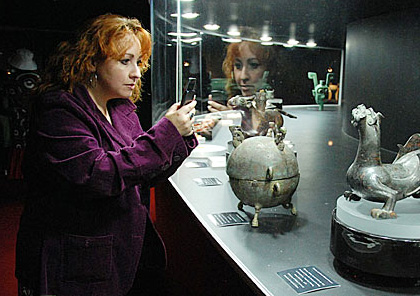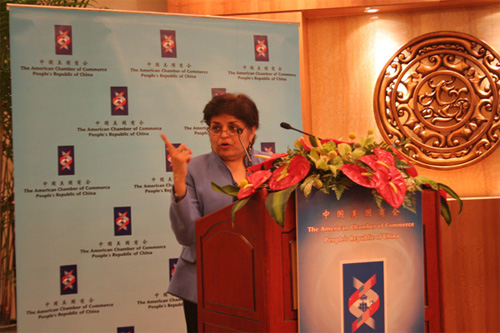Chinese cultural sights are major attractions for foreigners who want to get a better understanding of the country's past. But is that true only of ancient civilizations? If not, what represents modern Chinese culture in the eyes of Westerners?
CRI talked to an expert from an acclaimed U.S. cultural institution to find out.
Ancient ink paintings or cultural relic exhibits from China are still fresh to museum-goers in Europe and the United States, but foreigners at a cultural lecture in Beijing needed something a bit more up-to-date.
The lecture, sponsored by the American Chamber of Commerce in China, aimed to unfold the complex layers of contemporary Chinese culture, rather than those of its ancient history.

A visitor looks at Chinese cultural artifacts at a museum in Pretoria, South Africa, March 27, 2008. [Photo: Xinhua]
Dr. Vishakha Desai served as the keynote speaker at the event. She is the president of the Asia Society, an institution committed to promoting Sino-U.S. relations, especially from cultural and arts perspectives.
"When we say the role of culture, we must think about contemporary production of culture, as well as its past. I think that a romantic revival of the past without thinking of its relevance for the future and the present is, in fact, going to only put culture in a mausoleum. What we're going to think about is that culture is alive, and liveliness of culture means promotion of contemporary art practices, promotion of contemporary cultural tendencies. And contemporary culture in China and India or anywhere else is no longer going to be just isolated, because we live in a global world."
Desai pointed out that more western people became interested in Chinese culture after the country initiated the Reform and Opening-up policy in late 1970's. During that time, western knowledge of Chinese culture was limited. This inspired the Asia Society to do something different.
"What happened was that, in early 1980's in America, when people thought of Chinese art, they only thought of traditional art - ceramics, ancient Buddhas, things like that. That is a wrong perception. We needed to change that. We are very proud to say that we are the first institution in America to do the first major contemporary art exhibition from China. We started working on it from 1993 to 1994, and the exhibition was held in 1998. Today it is recognized as the single most important show of contemporary visual art from China."

Asia Society President Dr. Vishakha Desai speaks during a lecture sponsored by the American Chamber of Commerce in China on Wednesday, March 26, 2008 in Beijing. [Photo: CRIENGLISH.com/Luo Dan]
Desai formerly served as the organization's museum director, where she established her reputation by introducing contemporary Asian art to a broad western audience. She still remembers some of the Chinese artists who cooperated with the Asia Society in the early years.
"We have presented contemporary performing artists of China, so we are very proud of our relationship with Tan Dun and Cai Guoqiang. There are all great friends of the institution, and we are very proud of this relationship."
Tan Dun is no stranger to Chinese audiences. The composer and conductor won an Academy Award in 2001 for his soundtrack for the Ang Lee film "Crouching Tiger, Hidden Dragon." Desai said Tan became more popular with American audiences after participating in the 2006 world premiere of the opera "The First Emperor" in New York City.